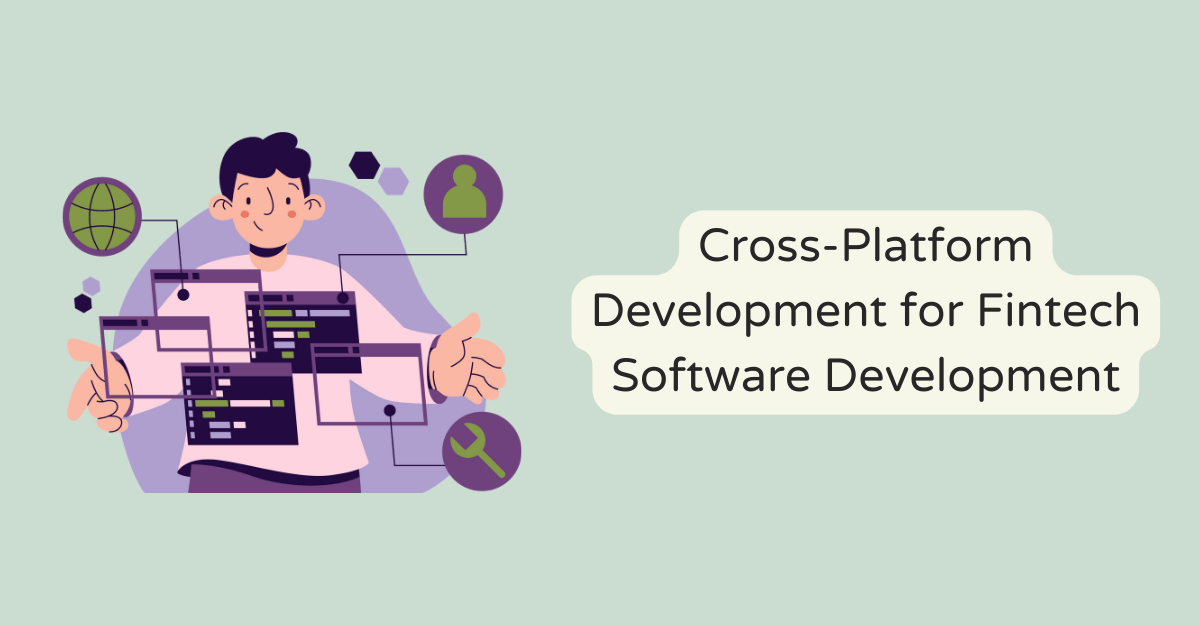
Cross-Platform Development for Fintech Software Development
As fintech companies strive to deliver innovative solutions to meet the evolving needs of consumers and businesses, the choice of development platform plays a crucial role in achieving scalability, efficiency, and cost-effectiveness. Cross-platform development emerges as a compelling solution, offering a versatile approach to fintech software development. In this comprehensive guide, we’ll explore the why, benefits, and frequently asked questions surrounding cross-platform development in the realm of fintech.
In the era of big data, where vast amounts of data are generated, processed, and analyzed in real-time, the demand for robust and scalable software solutions is greater than ever. Big data application require sophisticated algorithms, powerful processing capabilities, and seamless integration with various data sources and systems.
Why Cross-Platform Development?
- Versatility: Cross-platform development enables the creation of applications that can run seamlessly across multiple operating systems and devices, including iOS, Android, and web browsers. This versatility allows fintech companies to reach a broader audience and cater to diverse user preferences.
- Cost-Effectiveness: By leveraging a single codebase for multiple platforms, cross-platform development significantly reduces development time and costs compared to building separate native applications for each platform. This cost-effectiveness is particularly advantageous for startups and small businesses operating on limited budgets.
- Faster Time to Market: With cross-platform development frameworks such as React Native, Flutter, and Xamarin, developers can rapidly prototype, iterate, and deploy fintech applications, accelerating time to market and gaining a competitive edge in the dynamic fintech landscape.
- Simplified Maintenance: Managing updates, bug fixes, and feature enhancements becomes more streamlined with cross-platform development, as changes can be implemented across all platforms simultaneously. This simplifies maintenance efforts and ensures consistent user experiences across devices.
- Access to Native Features: Cross-platform development frameworks provide access to native device features and APIs, allowing developers to leverage the full capabilities of each platform while maintaining code reusability. This enables the creation of feature-rich fintech applications with native-like performance and functionality.
Benefits of Cross-Platform Development for Fintech:
- Scalability: Cross-platform development facilitates scalability, enabling fintech companies to expand their user base and add new features without the need for extensive redevelopment or platform-specific optimizations.
- Consistent User Experience: With cross-platform development, fintech applications deliver a consistent user experience across devices, ensuring that users can seamlessly transition between platforms without encountering differences in functionality or design.
- Enhanced Security: Cross-platform development frameworks prioritize security and offer robust mechanisms for data encryption, secure communication protocols, and authentication mechanisms, ensuring the protection of sensitive financial information.
- Integration Capabilities: Cross-platform development frameworks support seamless integration with third-party APIs, financial services, and backend systems, enabling fintech companies to create interconnected ecosystems that enhance user convenience and productivity.
- Agile Development: Cross-platform development fosters agile development practices, allowing fintech teams to iterate rapidly, gather feedback from users, and pivot as needed to meet evolving market demands and regulatory requirements.
This approach is instrumental in streamlining the development process, reducing costs, and accelerating time to market for businesses worldwide. S-Pro company, a distinguished player in the software development arena, excels in leveraging cross-platform development to deliver innovative solutions tailored to clients’ needs.
FAQs
- What is cross-platform development? Cross-platform development refers to the creation of software applications that can run on multiple operating systems and devices using a single codebase.
- Which cross-platform development frameworks are commonly used in fintech? Some commonly used cross-platform development frameworks in fintech include React Native, Flutter, Xamarin, and Ionic.
- How does cross-platform development differ from native development? Cross-platform development allows developers to write code once and deploy it across multiple platforms, while native development involves writing separate codebases for each platform (e.g., iOS and Android).
- Is cross-platform development suitable for all types of fintech applications? While cross-platform development offers many benefits, its suitability depends on factors such as the complexity of the application, performance requirements, and the need for platform-specific features.
- Can cross-platform development frameworks access native device features? Yes, cross-platform development frameworks provide access to native device features and APIs through platform-specific plugins and modules.
- How do cross-platform development frameworks handle platform-specific UI/UX design? Cross-platform development frameworks typically offer tools and components for creating platform-specific UI/UX designs that adhere to the guidelines and conventions of each platform.
- What are the performance considerations of cross-platform development in fintech? While cross-platform development frameworks strive to deliver native-like performance, developers should carefully optimize their code and leverage platform-specific optimizations to ensure optimal performance.
- How does cross-platform development impact app store approval and compliance with regulatory standards? Cross-platform development frameworks support app store approval processes and regulatory compliance by providing tools for testing, debugging, and performance monitoring across multiple platforms.
- What are the limitations of cross-platform development in fintech? Some limitations of cross-platform development include potential performance differences between platforms, limitations in accessing platform-specific features, and dependency on third-party frameworks and libraries.
- How does cross-platform development address security concerns in fintech applications? Cross-platform development frameworks prioritize security by offering built-in features for data encryption, secure communication protocols, and authentication mechanisms, along with regular security updates and patches.
Conclusion:
Cross-platform development offers fintech companies a versatile and cost-effective approach to building scalable, feature-rich applications that cater to diverse user needs and preferences. By leveraging cross-platform development frameworks and adopting agile development practices, fintech companies can accelerate time to market, enhance user experiences, and stay ahead of the competition in the rapidly evolving fintech landscape. With the right tools, strategies, and expertise, cross-platform development unlocks new possibilities for innovation and growth in the dynamic world of financial technology.





